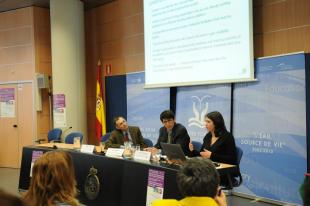Learning alliances are one of the ways that IRC supports WASH stakeholders to innovate, coordinate and collaborate. At the UN Water conference on 8-10 January 2013, in Zaragoza, Spain IRC shared lessons from SWITCH.
Published on: 06/02/2013
The United Nations proclaimed 2013 the International Year of Water Cooperation. IRC International Water and Sanitation Centre supports this focus and underlines the need for effective

collaboration between all actors for ensuring water and sanitation services that last for everybody.
Learning alliances are one of the ways that IRC supports WASH stakeholders to innovate, coordinate and collaborate. IRC shared its experience on how to make water cooperation happen in cities at the UN Water conference on 8-10 January 2013, in Zaragoza, Spain.
Marieke Adank presented lessons from the SWITCH project, which worked through city learning alliances and focused on some of the key sustainability challenges in urban water management. The presentation describes the city learning alliances and tools for enhancing cooperation; These include: visioning and participatory strategic planning, facilitating communication in learning alliance platforms, and process documentation.
As preparation for the 2013 International Year on Water Cooperation, the UN Water Conference focused on how to make water cooperation happen, identifying best approaches to promote effective cooperation at different levels and reflecting on how to 'do better' in water cooperation. The conference brought together some 120 sector professionals from different organisations, including UN organisations, NGOs, academic institution and private sector.
The session on water cooperation in cities was convened by CEO Water Mandate, with partners IRC and GWOPA/UN-Habitat. IRC was responsible for the key note presentation kicking-off this session. Conclusions from the session fed into the document 'Key lessons learnt on promoting water cooperation'.
The book 'SWITCH in the City: putting urban water management to the test', has city case studies, practical guides for learning alliance facilitation, outcomes and lessons learned.